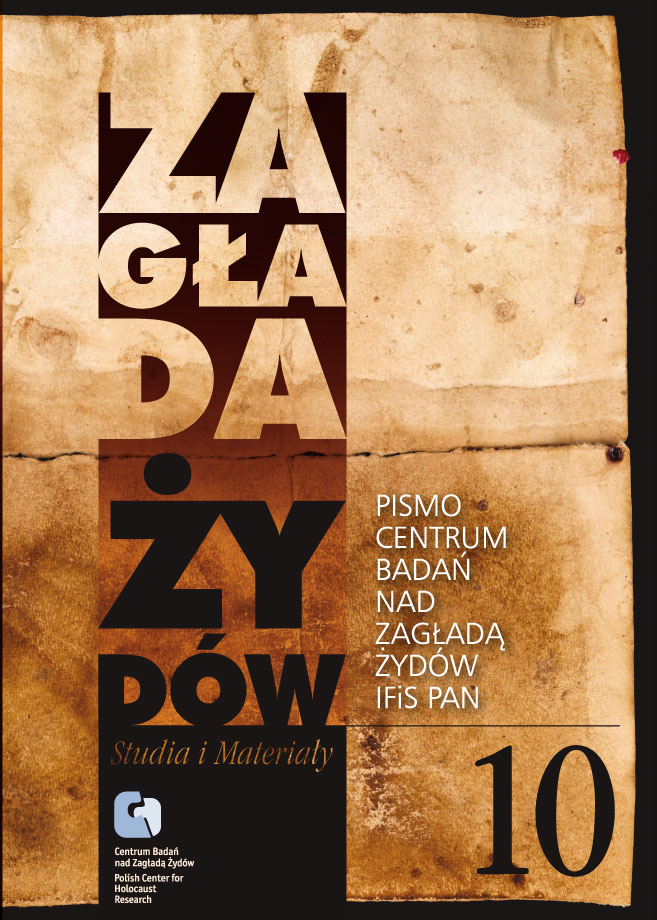Documenting Responsibility. Jenő Lévai and the birth of Holocaust historiography in Hungary during the 1940s
Zagłada Żydów. Studia i Materiały, No. 10 (2014), Pages: 354-383
Submission Date: 2020-10-22Publication Date: 2014-12-01
 https://doi.org/10.32927/ZZSiM.528
https://doi.org/10.32927/ZZSiM.528
Abstract
The article aims at presentation, analysis, and evaluation of the achievements of Jenő Lévai, the precursor of the research on the Holocaust of Hungarian Jews. Modern cross-section works regarding Hungarian Jews are to a large extent based on his works, which at the same time are gradually losing their reputation as their value is being increasingly questioned, and that contrasts with the scale of his past achievements at the beginning of the post-war period. Laczó analyses Lévai’s key publications: Endre László. A háborús bűnösök magyar listavezetője (1945), which talks about the main Hungarian planner and executor of the Holocaust, Black Book of the Suffering of Hungarian Jewry (1946), which was the first study on the Holocaust in Hungary, A pesti gettó csodálatos megmenekülésének hiteles története [true history of a miraculous escape from the Pest ghetto] (1947) about the ghetto in Pest, and Lévai’s main synthesis Zsidósors Magyarországon [history of Jews in Hungary] (1948). The author concludes most controversy over Lévai’s studies is caused by the ideological interpretation they offer and Lévai’s tuning to the communists’ political goals.
License
Copyright (c) 2014 Author&"Holocaust Studies and Materials"

This work is licensed under a Creative Commons Attribution 4.0 International License.
https://creativecommons.org/licenses/by/4.0
The journal is published under the Diamond Open Access Standard, CC-BY-4.0 Deed - Attribution 4.0 International - Creative Commons
Similar Articles
- Dan Michman, Dutch Society and the Jewish Fate: A Puzzling Record , Zagłada Żydów. Studia i Materiały: No. 12 (2016)
- Jacek Leociak, Understanding the Holocaust. A Task for Generations , Zagłada Żydów. Studia i Materiały: 2008: Holocaust Studies and Materials
- Heléna Huhák, András Szécsényi, Cavalcade of Interpretations: The Kasztner train Through the Self-narratives of the Fugitives , Zagłada Żydów. Studia i Materiały: No. 18 (2022)
- Roni Stauber, Philip Friedman and the Beginning of Holocaust Studies , Zagłada Żydów. Studia i Materiały: No. 11 (2015)
- Anna Abakunkova, Contemporary Holocaust Studies in Ukraine , Zagłada Żydów. Studia i Materiały: No. 10 (2014)
- Bartłomiej Krupa, Critical History and its “Shadow Cabinet.” Polish historiography on the Holocaust during 2003–2013 , Zagłada Żydów. Studia i Materiały: No. 10 (2014)
- Bartłomiej Krupa, Critical History and its ‘Shadow Cabinet’. Polish Historiography and the Holocaust during 2003–2013 , Zagłada Żydów. Studia i Materiały: No. Holocaust Studies and Materials (2017)
- Jacek Leociak, Marta Tomczok, Affective Holocaust Kitsch – Introduction , Zagłada Żydów. Studia i Materiały: No. 17 (2021)
- Justyna Kowalska-Leder, The folk history of the Holocaust and the turn to oral history archives , Zagłada Żydów. Studia i Materiały: No. 21 (2025)
- Editors Journal, Jan Grabowski, From the editors , Zagłada Żydów. Studia i Materiały: 2010: Holocaust Studies and Materials
1 2 3 4 5 6 7 8 9 10 11 12 13 14 15 16 17 18 19 20 21 22 23 24 25 26 27 28 29 30 31 32 33 34 35 36 37 38 39 40 41 42 43 44 45 46 47 48 49 50 > >>
You may also start an advanced similarity search for this article.
 English
English
 Język Polski
Język Polski








